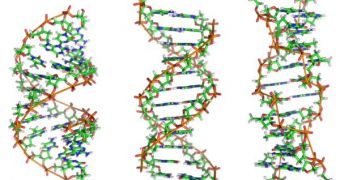Only a few, highly specialized labs in the world today can boast owning biomolecular computers, made entirely from DNA sequences and other biological molecules. They are able to perform complex computations and answer complicated queries, but are also very difficult to work with, which is one of the main reasons why they haven't made their way into the homes of average computer users. Now, experts Tom Ran and Shai Kaplan have devised a way of making them more user-friendly, even when operating at their most advanced parameters.
The two hold an appointment in Professor Ehud Shapiro's labs, at the Weizmann Institute of Science Biological Chemistry, and Computer Science and Applied Mathematics Departments. The team is the one to be praised for introducing the first autonomous programmable DNA computing device to the world, as far back as 2001. The accomplishment is amazing, when considering that about a trillion such computers fit in a single drop of water. At the time, more than eight years ago, they were able to make it go through a list of 1s and 0s, and determined if the number of 1s, for example, was even.
In 2004, they showcased a biomolecular computer that was able to find cancer in a test tube, and on the spot release a molecule that destroyed it. This opened up new avenues of research for the tiny instruments. Doctors imagine using them as mobile health units inside the body, injecting them into the bloodstream, and allowing them to take care of pathogens or microorganisms directly inside the body. Additionally, computer experts say, several millions of these instruments, running together could offer science virtually unlimited computational capabilities.
In a new paper published in today's issue of the journal Nature Nanotechnology, Shapiro and his team announce that they were able to make the biomolecular computers adhere to complex logic laws. The foundation of these laws was set more than 2,000 years ago, when the Greek philosopher Aristotle devised the simple “if-then” type of thinking. When presented with a rule (all men are mortal) and a fact (Socrates is a man), the tiny machines were able to correctly infer that Socrates is mortal, which is the logical conclusion. More complex lines of reason were also correctly deciphered.

 14 DAY TRIAL //
14 DAY TRIAL //